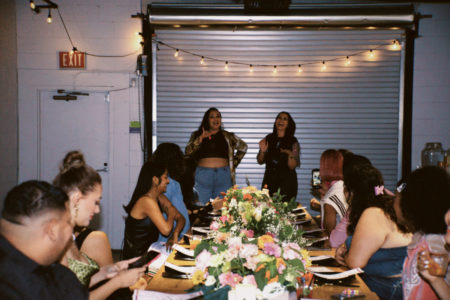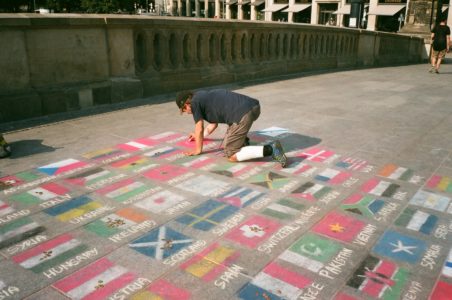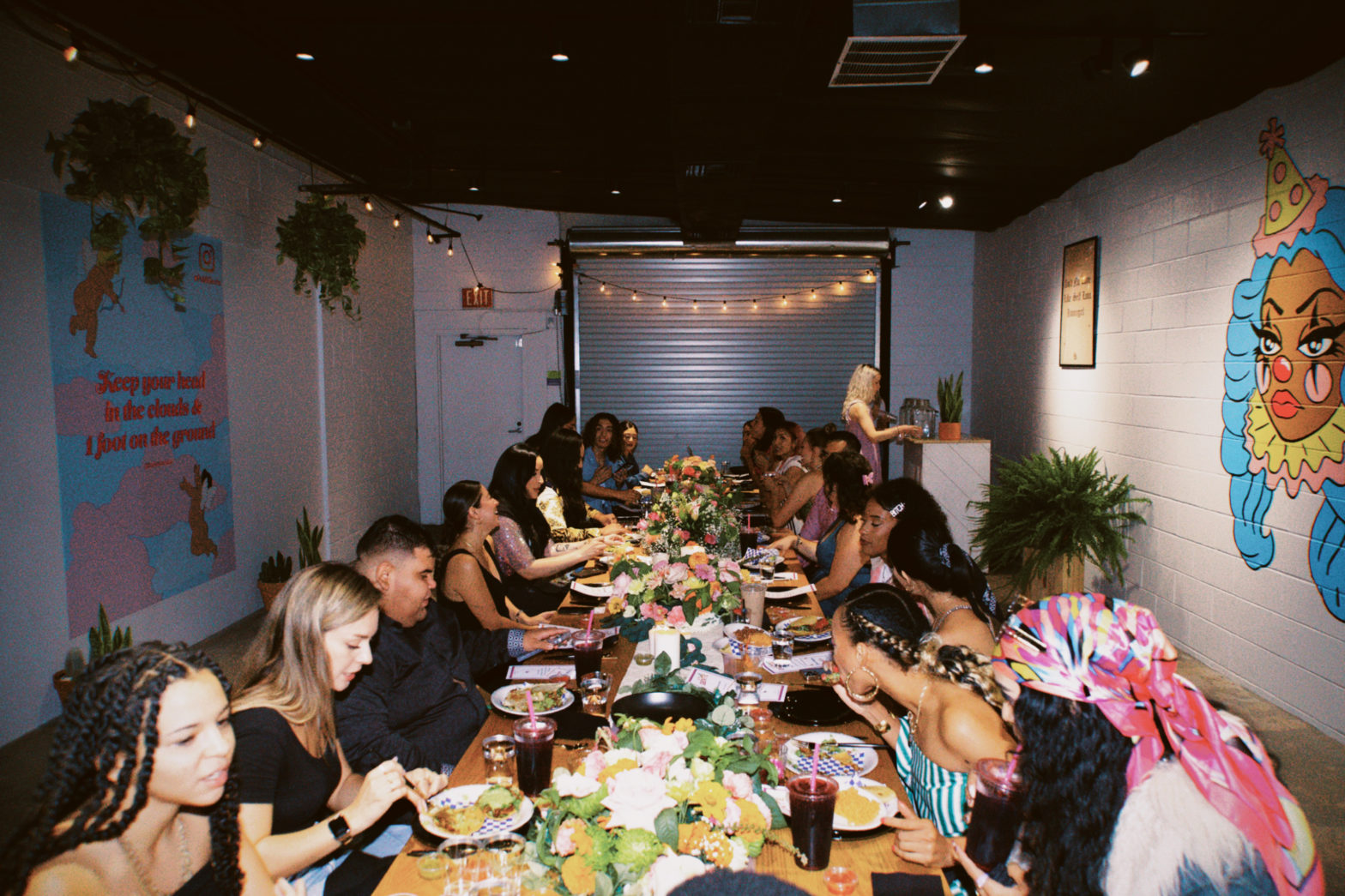In 2019, Latinx immigrants living in the U.S. made up 44% of the nation’s 44.7 million immigrants. Migrating to the United States is a very specific lived experience. Even if someone arrived more comfortably to the states by plane with a visa, they are not spared the sadness that comes with leaving all that you know for the unknown. Let us not forget that migration, although far from leisure, is also a form of travel. There is truly an untapped market of travel stories that speak to the migration experience; as well as the collective wisdom for resiliency. With this in mind, Travel Noire (TN) attended Instagram’s Latinx Heritage Month dinner in Los Angeles, Hosted by Bella Doña, and spoke with Latinx influencers, who are first- generation United States Latinx citizens, about their experiences traveling back home to their motherland.
Place Specific Identities We Carry
When we think of “homecoming” we often associate feelings of nostalgia, joy, and triumph. These are all true, however for immigrants it also can bring up feelings of guilt, identity crises, and confusion. As was the case for Arianna Williams, who visited Puerto Rico for the first time when she was 18. Arianna shared with TN that she grew up in Phoenix, knowing she was Dominican and Puerto Rican. Growing up, she also felt a strong sense of self tied to her ethnicity. It has always been an identity she held close to her, despite never having been on either of the islands. Especially, having family in New York City, where there are both strong Puerto Rican and Dominican communities, she always dreamed of one day being able to visit the islands. Finally at 18 years old, Arianna was able to visit Puerto Rico for the first time and spend time with her extended. Although a beautiful trip, Arianna share feelings out of place. “It was unsettling to not feel a part of a community that I identify with so heavily.”
Jesus Nalgas, a Mexican- American comedian on Tik Tok, also spoke to this sentiment. “I grew up going back to Mexico and love it. It’s very different there though. Things back home feel more routine – people wake up early, go to work, come home and that’s about it. It’s a very content lifestyle without much. However, here in LA I’m used to all the options we have of things to do. Home is also much more traditional and I find myself more accepted in LA. Regardless, I love Mexico!”
Then there are the stories that separate the Latinx immigrant community. There are those of us who grow up traveling back to their mother land every year, since their parents migrated. While there are others, who because of financial limitations, are not able to go back home as often as others in their family. This year, Alexia Del Valle, a Puerto Rican content creator from South Jersey, recently spent two weeks in Puerto Rico with her family. “I love Puerto Rico! There is no place like it. The food, the people, the music, it just hits different in PR” she shared. “I didn’t grow up going back to the island as often as my family would have liked. Flights for a family of four were very expensive but my family always made sure that in New Jersey the culture was very much alive. I have strong ties to PR, but I don’t have the same childhood memories as some of my cousins who grew up going every summer. So now when I go to PR it does take me a bit to find myself.”

Acknowledging Our Privilege
Arinze Emeagwali, Cultural Content Marketer for Instagram, shared that he grew up going back to Nigeria very often. He shared a bit about his experience visiting the Dominican Republic for the first time with a friend. This is a beautiful perspective to have, as a lot of the identities found on the Caribbean islands are deeply rooted in the history of the diaspora. Arinze shares visiting with his friend who had family on the island. They stay in Monte Cristi, a small rural town. “I loved that I got the real experience, and not the touristy one. But I’m not going to lie, when I went to take a shower and asked where the hot water was, everyone laughed at me!” Speaking from experience, I relate to Arinze, the first cold shower in the Dominican Republic is always a humbling experience.
The lack of access many Latin American countries have to many basic necessities, really makes one realize why it is that their parents made the sacrifice of living everything behind to come to the United States. This has been my experience. I was born in the Dominican Republic, and spent my early childhood there. I hated trading in our back yard for the concrete jungle that is the South Bronx. I didn’t grow up visiting every year because we couldn’t afford it. I envied my cousins who spent every summer break on the island. They always came back tanned, with all the Dominican candies to share, and with endless stories about their time on our family farm. There was one point in time, when my immediate family and I waited to long to visit back. I was in high school at the time. I was so eager to go back. I missed home so much. However, traveling back home felt like a rude awakening. I could tell all the ways I had become Americanized – I got used to good wifi, running water, electricity that wouldn’t go out, and the comfort that comes from an AC on scorching hot summer days. It made me realize how even though we are poor in America, we still have the basic necessities. Feelings of sadness and rage at the way the US has exploited the Island and its resources. I also felt guilt about my discomfort with wanting first world luxuries, that my family does not have access to back home. A guilt my parents also feel but try to compensate by taking luggages full of clothes for our family members still on the island; and also by leaving our clothes behind to those that need it most. We always come back to New York City empty handed, but with our heart full in ways that only spending time with your loved ones can do.
Lack of access:
The lack of access many Latin American countries have to many basic necessities, really makes one realize why it is that their parents made the sacrifice of living everything behind to come to the United States. This has been my experience. I was born in the Dominican Republic, and spent my early childhood there. I hated trading in our back yard for the concrete jungle that is the South Bronx. I didn’t grow up visiting every year because we couldn’t afford it. I envied my cousins who spent every summer break on the island. They always came back tanned, with all the Dominican candies to share, and with endless stories about their time on our family farm. There was one point in time, when my immediate family and I waited to long to visit back. I was in high school at the time. I was so eager to go back. I missed home so much. However, traveling going back home felt like a rude awakening. I could tell all the ways I had become Americanized – I got use to good wifi, running water, electricity that wouldn’t go out, and the comfort that comes from an AC on scorching hot summer days. It made me realize how even though poor in America, we still have the basic necessities. Feelings of sadness and rage at the way the US has exploited the Island and its resources. I also felt guilt about my discomfort with wanting first world luxuries, that my family does not have access to back home. A guilt my parents also feel but try to compensate by taking luggages full of clothes for our family members still on the island; and also by leaving our clothes behind to those that need it most. We always come back to New York City empty handed, but with our heart full in ways that only spending time with your loved ones can do.

Our Ancestors Wildest Dreams
To make peace with the privileges afford to us in America, that our relatives back home do not have, is a process in and of itself. The feeling is similar to being the first in your family to go to college and having a corporate job that gives you the social mobility to move out and live better than your parents. But in the same breath, to not take advantage of the privileges would mean our parent’s sacrifices were for nothing.
One content creator, Greisy Hernandez, with roots in Mexico, shared her experience solo traveling across the US for hackathons. An experience made possible because of the sacrifices her parents made to be in this country. Greisy shared “I traveled by myself for a few months and although it wasn’t back home to Mexico, this experience forced me to find a home within myself. I was often in places where I didn’t know anyone and I felt alone. I developed practices during my travels whenever I was feeling alone to ground myself and feel at home with myself — even if thousands of miles away from my family.”
This begs a deeper question, “what is home?” Is it our place of birth or where our family is from? Is it a place within us, or as the saying goes is it “where the heart is?” This is a nuanced question for the Latinx immigrants who at times feel home is multiple places, inside us, or nowhere at the same time. But nonetheless, it’s always a place we’re searching for. To quote a Dominican merengue band, La Banda Gordo who sings, “Estoy aqui pero mi mente esta alla, y no pierdo la esperanza de un dia regresar.” This translates to, “I am here, but my mind is over there. And I’m not losing the hope of one day being able to return.”
Content Creators Pushing Culture Forward
Unlike the at the many influencer events that take place in Los Angeles, a welcoming and humbling family energy flowed throughout the space. At dinner, we all came together to talk and get to know another more intimately. The two creators of Bella Doña, an LA born streetwear brand, are two Latinx women who met on Instagram. Since that initial DM, the two have created a brand and community of women of color across the country. With that power of social media in mind, a speaker from Meta announced Dale Tú, Instagram’s Latinx and Hispanic Creator Program! This is a new initiative aimed to help creators build sustainable businesses and grow their audience through funding, education, partner support and community-building. The initiative is a celebration of all the existing talent in the community, and encouragement for others to follow their dreams.
